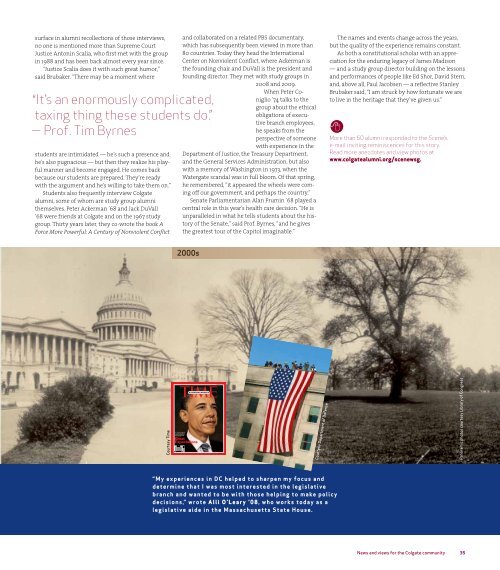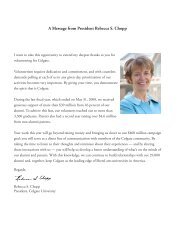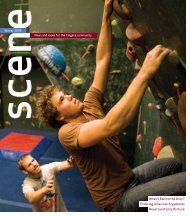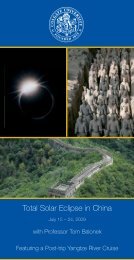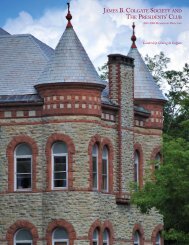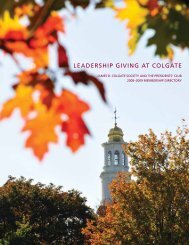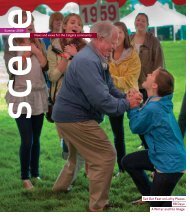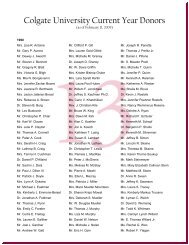101 Things To Do Before You Graduate Living In History ... - Alumni
101 Things To Do Before You Graduate Living In History ... - Alumni
101 Things To Do Before You Graduate Living In History ... - Alumni
You also want an ePaper? Increase the reach of your titles
YUMPU automatically turns print PDFs into web optimized ePapers that Google loves.
surface in alumni recollections of those interviews,<br />
no one is mentioned more than Supreme Court<br />
Justice Antonin Scalia, who first met with the group<br />
in 1988 and has been back almost every year since.<br />
“Justice Scalia does it with such great humor,”<br />
said Brubaker. “There may be a moment where<br />
“It’s an enormously complicated,<br />
taxing thing these students do.”<br />
— Prof. Tim Byrnes<br />
students are intimidated — he’s such a presence and<br />
he’s also pugnacious — but then they realize his playful<br />
manner and become engaged. He comes back<br />
because our students are prepared. They’re ready<br />
with the argument and he’s willing to take them on.”<br />
Students also frequently interview Colgate<br />
alumni, some of whom are study group alumni<br />
themselves. Peter Ackerman ’68 and Jack DuVall<br />
’68 were friends at Colgate and on the 1967 study<br />
group. Thirty years later, they co-wrote the book A<br />
Force More Powerful: A Century of Nonviolent Conflict<br />
Courtesy Time<br />
and collaborated on a related PBS documentary,<br />
which has subsequently been viewed in more than<br />
80 countries. <strong>To</strong>day they head the <strong>In</strong>ternational<br />
Center on Nonviolent Conflict, where Ackerman is<br />
the founding chair and DuVall is the president and<br />
founding director. They met with study groups in<br />
2008 and 2009.<br />
When Peter Co-<br />
niglio ’74 talks to the<br />
group about the ethical<br />
obligations of executive<br />
branch employees,<br />
he speaks from the<br />
perspective of someone<br />
with experience in the<br />
Department of Justice, the Treasury Department,<br />
and the General Services Administration, but also<br />
with a memory of Washington in 1973, when the<br />
Watergate scandal was in full bloom. Of that spring,<br />
he remembered, “it appeared the wheels were coming<br />
off our government, and perhaps the country.”<br />
Senate Parliamentarian Alan Frumin ’68 played a<br />
central role in this year’s health care decision. “He is<br />
unparalleled in what he tells students about the history<br />
of the Senate,” said Prof. Byrnes, “and he gives<br />
the greatest tour of the Capitol imaginable.”<br />
2000s<br />
Courtesy Department of Defense<br />
“My experiences in DC helped to sharpen my focus and<br />
determine that I was most interested in the legislative<br />
branch and wanted to be with those helping to make policy<br />
decisions,” wrote Alli O’Leary ’08, who works today as a<br />
legislative aide in the Massachusetts State House.<br />
The names and events change across the years,<br />
but the quality of the experience remains constant.<br />
As both a constitutional scholar with an appreciation<br />
for the enduring legacy of James Madison<br />
— and a study group director building on the lessons<br />
and performances of people like Ed Shor, David Stern,<br />
and, above all, Paul Jacobsen — a reflective Stanley<br />
Brubaker said, “I am struck by how fortunate we are<br />
to live in the heritage that they’ve given us.”<br />
8<br />
More than 60 alumni responded to the Scene’s<br />
e-mail inviting reminiscences for this story.<br />
Read more anecdotes and view photos at<br />
www.colgatealumni.org/scenewsg.<br />
News and views for the Colgate community<br />
Panoramic photos courtesy Library of Congress<br />
35


